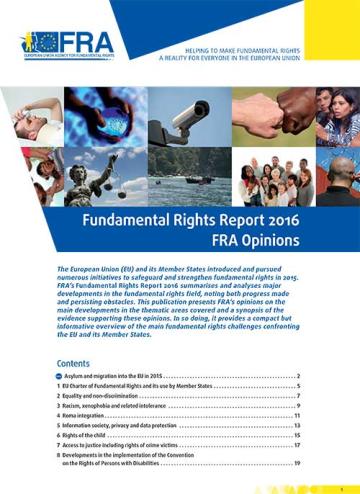Help us make the FRA website better for you!
Take part in a one-to-one session and help us improve the FRA website. It will take about 30 minutes of your time.

Fundamental Rights Report 2016
fundamental rights in 2015. Some of these efforts produced important progress; others fell short of their aims. Meanwhile,
various global developments brought new – and exacerbated existing – challenges.
The arrival of over one million refugees and migrants strained domestic asylum systems and risked triggering rights violations, including by fuelling xenophobic reactions. But it also prompted considerable support from citizens and EU-level initiatives, including relocation and resettlement measures. The year’s developments were also marked by a string of terrorist attacks across the EU. Some legislators sought to extend the powers of intelligence services, and concerns about further attacks put data collection and retention back on the agenda. Many discussions of such proposals, however, acknowledged the importance of safeguarding rights, and an agreement on a reformed EU data protection package showed promise.
Some challenges proved particularly persistent. Five years before the deadline set for the EU 2020 goals, the proportion of children at risk of poverty or social exclusion remained high. Discussions on the Equal Treatment Directive entered their seventh year – without successful conclusion in sight. Although insights about the importance of local action began shaping Roma integration efforts, these continued to face serious hurdles.
But 2015 also brought positive news. Measures to make the judicial process more child-friendly yielded clear progress, and a variety of initiatives strengthened the procedural rights of individuals involved in criminal proceedings. It was also a milestone year for the rights of crime victims, with the November deadline for transposing the Victims’ Rights Directive triggering an array of legislative changes. Another milestone was the completion of the first review of the EU’s implementation of the Convention on the Rights of Persons with Disabilities (CRPD) by the United Nations CRPD Committee – the first time an international body examined how the EU is fulfilling its human rights obligations. These obligations include raising awareness of the EU Charter of Fundamental Rights. As the report’s chapter on the Member States’ use of the Charter underscores, further efforts are necessary to better familiarise EU citizens and relevant professional groups with this important instrument.
This year’s Focus section takes a closer look at asylum and migration issues in the EU. It explores the risks refugees and migrants face to reach safety; addresses challenges with regard to non-refoulement and the prohibition of collective expulsion; outlines developments and possible solutions in the field of asylum; and discusses developments on the issue of returns.

